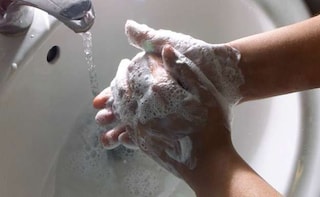Adults who were given access to online advice saw a 15% to 25% reduction in infections compared with the control group. Photograph: Graham Turner for the Guardian
The trial of an online scheme that educates adults about proper hand-washing techniques has offered the first conclusive evidence that washing your hands makes a difference in reducing infection.While hand washing has been accepted as important for reducing the spread of viruses and infections for many years, a three-year study involving more than 20,000 British adults, the results of which are published on Friday in the Lancet, is the first large-scale randomised test to confirm that increased hand washing leads to lower rates of infection among adults."Until this trial it wasn't really clear whether hand washing really did work. We had evidence from other settings [notably studies conducted in developing countries and a study of very young children in Australia], but not in a westernised setting among adults," said lead researcher Paul Little, professor of primary care research at the University of Southampton.
The trial of an online scheme that educates adults about proper hand-washing techniques has offered the first conclusive evidence that washing your hands makes a difference in reducing infection.While hand washing has been accepted as important for reducing the spread of viruses and infections for many years, a three-year study involving more than 20,000 British adults, the results of which are published on Friday in the Lancet, is the first large-scale randomised test to confirm that increased hand washing leads to lower rates of infection among adults."Until this trial it wasn't really clear whether hand washing really did work. We had evidence from other settings [notably studies conducted in developing countries and a study of very young children in Australia], but not in a westernised setting among adults," said lead researcher Paul Little, professor of primary care research at the University of Southampton.
Advertisement
Advertisement
Advertisement
For the latest food news, health tips and recipes, like us on Facebook or follow us on Twitter and YouTube.
Advertisement
